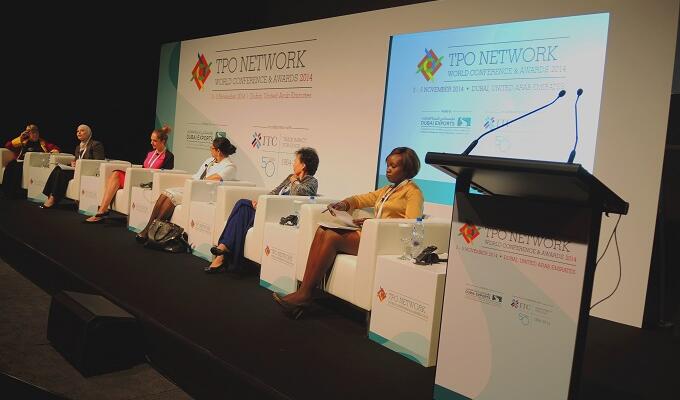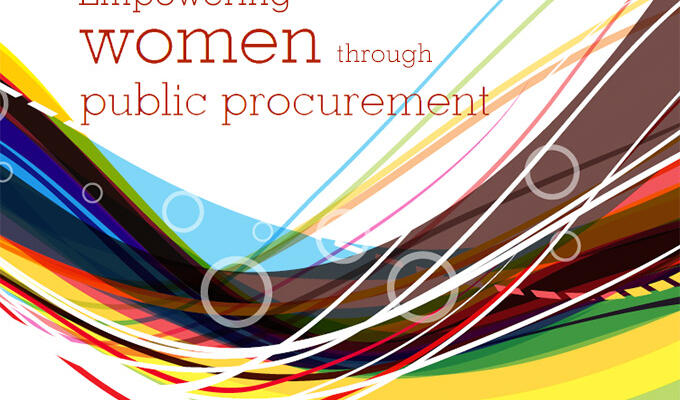

Trade and investment organizations outline their stronger role to support women-owned businesses (en)
Governments are investing in women-owned businesses because they think it will make a difference to their economies, said panellists at a session on empowering women in the global economy.
Women constitute half of the world’s population, but are far from having an equal share in trade and investment opportunities.
Women-owned businesses are not fully capturing opportunities to integrate in to corporate value chains. Public procurement accounts for over 30% of Gross Domestic Product in developing countries and some 10-15% of GDP in developed countries. Yet women-owned businesses have been largely excluded from this sizable market, due to lack of access to information on bids, understanding of procedures and ability to meet requirements.
“We believe partnerships are the answer, and trade promotion organizations (TPOs) are at the root of the solution,” said Vanessa Erdgobobo, Programme Officer of the Women and Trade Programme. TPOs are vital to help connect women business owners to government and corporate buyers. She urged TPOs to champion the initiative and use ITC’s new guide, Empowering Women through Government Procurement.
“What matters most is that women and men can work together to reach higher heights with equal opportunities,” said Dr. Wong Lai Sum, CEO of MATRADE, in delivering the keynote speech for the session. Of 645,000 SMEs in Malaysia, less than 20% are owned by women. Fewer than 12.4% of its current exporters are women.
MATRADE therefore developed a Women Exporters Development Programme to build the capacity of women to compete in international markets. Starting with10 companies, it has now assisted 1700 women-owned SMEs to become active exporters. A key to success was a nationwide campaign to reach out to individual associations, chambers of commerce, academia and professional bodies, combined with a very strong export capacity building programme.
The focus is on developing capabilities, not in advocating for access quotas, so that they compete and win contracts on the base of merit. “Women are like tea bags. You will never know how strong they are until you immerse them in water, said Dr Wong, quoting Eleanor Roosevelt. “Immerse them in trade, and they will be the force of tomorrow.”
Zahra Maafiri, Director General of Maroc Exports added that strong role models of women in science, technology and business should be championed as a goal and vision for the future. “We need to reach out to rural areas and small cities to empower women” to grow in these areas,” she said. Morocco has encouraged a week dedicated to promotion of women exporters, with success stories shared by radio across the country; it has hosted major international conferences on this theme and included chapters dedicated to women in its major export publications.
Hana Uraidi, Acting CEO of the Jordan Enterprise Development Corporation, said Jordan has a specific women’s economic development strategy. “We’re all standing up and leaning in, and towards becoming smart economies, investing in sustainability and inclusiveness.”
Measures to improve self-assurance and build networks are at the heart of Austrade’s programme for women to increase their share in international trade and investment. “Research reveals a confidence gap,” said Elodie Journet, Austrade’s Trade Commissioner in Dubai. For example, Austrade reviewed academic studies noting that women would only apply for promotion if they filled 100% of the criteria, while men applied when they fulfilled only 60% of the criteria. Its free networking platform offers information about financing, mentoring and trade information, a mid-career professional business scholarship programme, and speaker series to showcase role models.
“In working with women in businesses across 100 countries, confidence came up as an issue every single time,” said Virginia Littlejohn, CEO of Quantum Leaps. TPOs can partner with women’s institutions to ensure that outreach is a key to success.
Several recommendations emerged from the discussion.
- Trade promotion organizations have a critical role to play between governments and multinationals to ensure that women-owned businesses are more connected to value chains.
- Mapping, capacity building, export diversification into higher growth industries should be part of TPO strategies to ensure that women, who constitute half of the world’s population, are integrated in the economy.
- Confidence for women is an issue that spans all cultures. Women need role models, best practices and success stories to give them the confidence to succeed.
- A call to cooperate regionally or internationally, especially for developing countries with scarce resources. Sharing best practices among TPOs through collection of sex-disaggregated data, awards, and best practice publications.
- TPOs should work with women’s organizations and networks to ensure they reach out widely.
- They should also embed promotion of women in trade in national development planning, in various agencies (not just women’s agencies) and in national export strategies.



